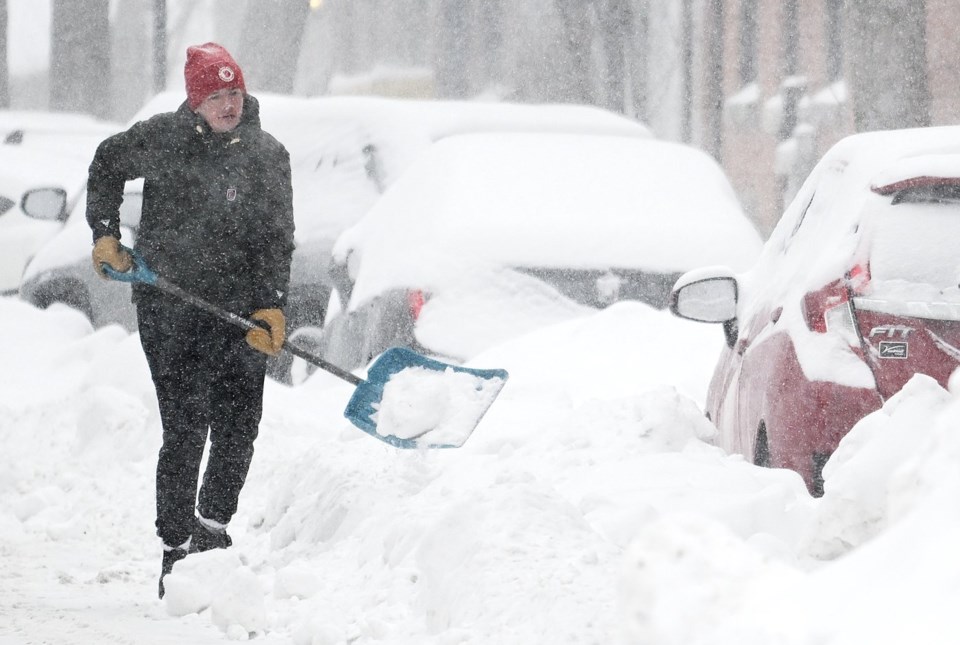A winter storm that blanketed much of Ontario and Quebec this weekend has tapered off, but the cleanup will take more than one week in Montreal and up to three weeks in Toronto, officials in both cities said Monday.
Up to 25 centimetres fell on Toronto, on top of a similar-sized dump last week — the city's hasn't had to deal with that much accumulated snow since a storm in January 2022. About 40 cm of snow had fallen in Montreal as of 11 a.m. Monday morning, for a total of 74 cm since last Thursday.
"This is a historic situation," Montreal Mayor Valérie Plante said on X. "The last time Montreal received this much snow in such a short period of time was in the 1950s." Travel will not be easy this week, but the situation will gradually improve, she added.
Ottawa, meanwhile, was hit with 70 cm of snow since Wednesday evening, said Jake Gravelle, a manager in the city's public works department. "Holy snow, Batman! It seemed like it was never going to stop," began a winter operations update sent Monday morning.
"Crews are doing their best; however, we recognize snowbanks are high, sidewalks are still snow covered and roads are narrow. Cleanup will take several days to complete and it remains challenging to get around the city today."
Snowfall warnings ended in Toronto on Sunday night, with the storm tapering off in the Ottawa and Montreal areas by Monday morning. The storm led to major travel headaches for the Family Day long weekend in Ontario, cancelling dozens of flights out of major airports and causing a myriad of transit disruptions.
Trucking away the large windrows of plowed snow that are restricting traffic and blocking sidewalks could take three weeks, Toronto officials said in a news conference. It can take 10 hours to clear a one-kilometre stretch of road; a loader or truck-mounted snowblower slowly unloads the snow into a dump truck, which then carries it to a city storage or melting site. Hospitals, main streets, transit stops, school bus loading zones and sidewalks are priority areas, they said.
"Toronto is a big city and this work takes a lot of time," Barbara Gray, the city's transportation services general manager, told reporters.
Officials warned drivers to avoid parking on designated snow routes or where temporary orange signs have been set up to indicate snow removal is planned. They said around 2,300 vehicles had been ticketed.
Lisa Stasyshyn, who was walking near Toronto's waterfront Monday morning, said she got caught in a transit nightmare on Sunday, waiting an hour to catch a streetcar as drivers parked near transit routes and snow plows were prevented from clearing snow. "No one could move," Stasyshyn said. "We were so tired from walking."
Nicholas Morris, a supervisor at Toronto's Harbourfront Centre skating rink, was shovelling snow off nearby benches on Monday after clearing the rink. Several people were on their skates already, but Morris said he was expecting "quite a bit more" activity later on Family Day. It took him some time — and some heavy labour — to get his car out of the driveway Monday morning, he said.
"With my dad's help pushing the car out … we were able to make it out," he said. "I got the winter tires on, thankfully."
In Montreal, English school boards and French-language school service centres cancelled classes at primary and high schools.
A city spokesperson described the weather as an "exceptional situation." Philippe Sabourin said half of the city's sidewalks weren't cleared because there was nowhere left to put the snow. Montreal postponed all curbside pickup until next week, and snow removal will take a minimum of eight days, Sabourin said.
"It's going to be a huge challenge," Sabourin said. "We have 3,000 employees, 2,500 trucks on the road, we're doing our best to (speed up) the operation, to be more efficient."
He called on residents — especially young people at home on the snow day — to help others in need, by doing such things as clearing entrances to homes of vulnerable people, or helping the city by digging out fire hydrants. "It's going to be a long process, we need the collaboration of everyone," Sabourin said. "Please be kind, help your neighbours."
As the storm moved east, parts of New Brunswick were blanketed by thick snow that tapered off Monday morning. Bas-Caraquet in the Acadian Peninsula saw about 37 cm, while Anfield in the northwest part of the province received about 20 cm.
Prince Edward Island was hit with a mixture of snow and ice, said Environment Canada meteorologist Jill Maepea. But Canada's smallest province was seeing strong wind gusts on Monday with speeds reaching up to 100 kilometres per hour in the town of Summerside.
Back in Ontario, Environment Canada said a snow squall warning remained in effect Monday for communities along the Bruce Peninsula and in the Georgian Bay area, as another 30 to 60 cm was expected to fall starting Monday morning and into Tuesday. The agency warned that snow brought on by the lake effect could bring near zero visibility during snowfall.
Non-profit Save Georgian Bay said Monday it was cancelling its fourth annual polar bear dip fundraiser, which had been scheduled for this coming Saturday. "This year’s extreme weather has made the park and shoreline unsafe for gathering and dipping," the group said.
It is planning a virtual event instead.
This report by The Canadian Press was first published Feb. 17, 2025.
— With files from Sidhartha Banerjee in Montreal and Hina Alam in Fredericton.
Maan Alhmidi and Jordan Omstead, The Canadian Press

